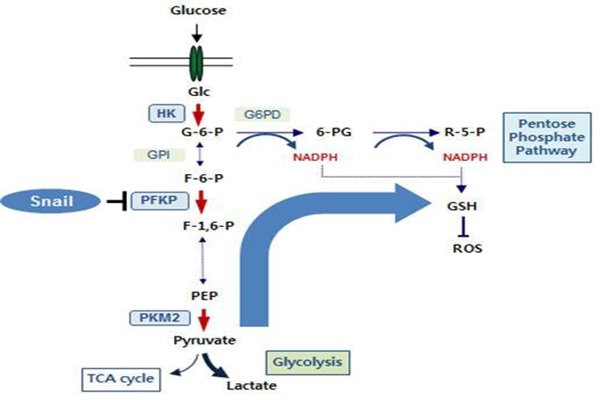Metastatic cancer cell’s survival mechanism has been discovered.
Professor Yuk Jong-in of Yonsei University and a research team led by Professor Hwang Geum-sook of Korea Basic Science Institute made an announcement on the 21st that they discovered a mechanism of how cancer cells survive and change metabolic pathway during ‘metastasis process’, which is a process where cancer cells spread to other organs from an organ where they were developed first. Metabolism is a chemical reaction that occurs when life has to be maintained within a cell.
Research team was able to discover that the process of cancer cells spreading by attacking nearby organs occurs as cancer cells inhibit metabolism by inhibiting metabolite called PFKP (Phosphofructokinase) through particular protein called ‘Snail’.
In order to overcome and survive from starvation state where there is no supply of glucose, cancer cells readjust flow of saccharometabolic pathway, which is a pathway where carbohydrates usually move as glucose when they move within cells, by utilizing Snail. Flow of metabolic pathway for glucose can be changed by inhibiting aerobic glycolysis, which is saccharometabolic pathway that changes glucose into lactic acid regardless of existence of oxygen, and vitalizing PPP (Pentose Phosphate Pathway) that oxidizes glucose-6-phosphate into ribulose-5-phosphate.
Research team was able to discover the fact that metastatic cancer cells obtain power of restoration by having Snail inhibit PKFP that acts as a role of a switch for aerobic glycolysis and PPP within saccharometabolic pathway.

Fact that metastatic cancer cells utilize PFKP as the major substance in inhibiting metabolism was also found in animal testing. From an animal’s metastatic model, Snail which is a carcinogenic gene increases metastasis of lung which was again inhibited with increase in PFKP. Research team explained that this model shows that Snail inhibits expression of PKFP in order to increase viability of cancer cells and induce metastasis of cancer within a body.
“Result of this research that had lasted 6 years is the first research report on metastatic cancer cells inhibiting metabolism and a research where researches were almost nonexistent and we were able to find out that cancer cells survive by inhibiting metabolism through catabolism rather than proliferation.” said Professor Yuk Jong-in. “We are going to provide basis so that current metabolic drugs, which are heard as the target of metabolic pathway, can be applied to treatments of cancers by providing new metabolic therapy target.”
Result of this research was published on Nature Communications, which is a scientific journal, on the 8th of February.
Staff Reporter Song, Hyeyoung | hybrid@etnews.com